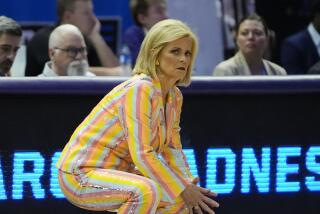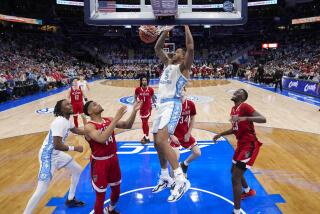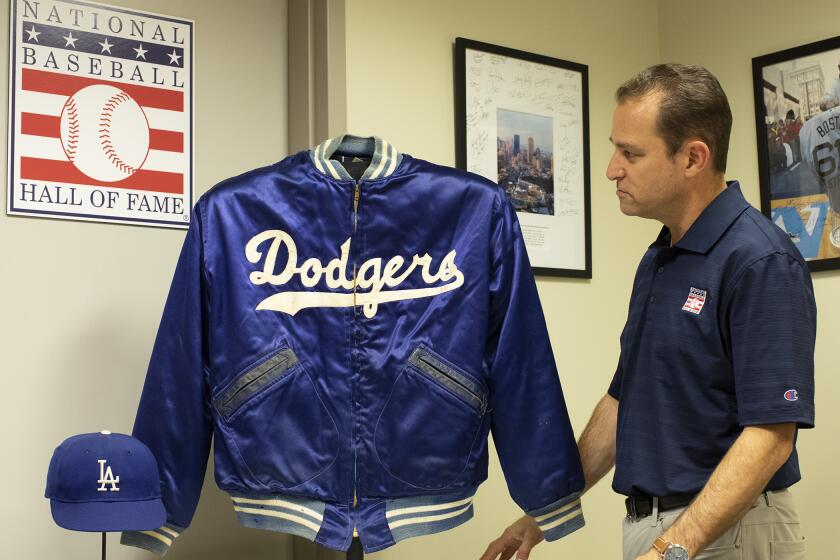COLLEGE BASKETBALL : In Its Third Season Back, Tulane Rates a Perfect 10
- Share via
To know where you are going, Tulane Coach Perry Clark says, you must first know where you have been. That explains why Clark proudly displays a photograph taken of him during the final game of the longest season of his life, 1989-90, the year Green Wave basketball sputtered back to life.
Head slumped in hands, one knee dropped to the floor, Clark had the look of someone counting the nanoseconds until a 4-24 season was complete. Taken during Tulane’s first and last game in the Metro Conference tournament that season, the picture reminds Clark how far the Green Wave program has come since a point-shaving scandal and alleged player payoffs caused school officials to shut it down after the 1984-85 season.
“That (photo) kind of summed up the season that first year,” Clark said. “It seems like a long time ago. But I think that first year helped toughen all of us up.”
Now look at Tulane. At 12-0, the Green Wave is off to its best start since 1923. And for the first time in 43 years, it is ranked in the Associated Press poll. Keep this up and the Green Wave could earn its first invitation to the NCAA tournament.
“I’ll tell you what, I’m afraid to pinch myself right now,” said Clark, who left Bobby Cremins’ Georgia Tech staff in the summer of 1988 to oversee the rebuilding of a program scarred by controversy. “I’m surprised a little bit with how fast we’ve been able to come together as a cohesive team.”
Clark’s career has always included surprises. For example, after graduating from Gettysburg (Pa.) College, Clark was offered a job by his former high school coach, Morgan Wootten of legendary DeMatha in Hyattsville, Md. Wootten’s teams have long produced countless college players and some notable NBA stars, including Adrian Dantley.
Among Clark’s many duties was chauffeuring visiting college coaches from the airport to a Wootten-run summer basketball clinic. One day, he was told to pick up Louisville Coach Denny Crum.
For an entire week, Clark acted as a taxi service for Crum. Not surprisingly, Clark loved every minute of it and never forgot the thrill of listening to Crum.
Of course, Clark has never told Crum about that week. Then again, maybe the timing hasn’t been right.
Clark had his chance a few weeks ago, when his Tulane team defeated Crum’s Cardinals at Louisville’s Freedom Hall--another first for the Green Wave. Afterward, Clark met Crum on the sideline, shook hands, and thought briefly about his days as a part-time driver.
“But after the game I don’t think Denny wanted to listen,” Clark said.
Add Tulane: This isn’t a team of stars. Forward Anthony Reed could be, but that’s not the way it works in Clark’s system. Instead, Clark uses a 10-man rotation. The starters play for the first five minutes, then find themselves replaced by “the Posse,” which is a completely new lineup led by sophomore guard Kim Lewis, who actually leads the team in scoring with an average of 16.3 points. “The Posse” stays for about seven minutes, then returns to the bench. The process is repeated in the second half.
The idea is simple enough: Wear down opponents, keep your own players fresh and happy--10 players average about 15 minutes a game--and win games.
No other team, at least none that Clark can think of, uses the Tulane method. North Carolina used to, as did Iowa. “But we kind of brought them in as a group,” Clark said.
Clark, 40, is different that way. When Tulane asked if he was interested in doing the near-impossible--rebuild a program from scratch--he didn’t think twice.
“Probably because I’m a little nuts,” he said. “It took a little bit of insanity. I remember thinking, ‘OK, Clark, you think you’re pretty good. Now we’ll find out how good you are.’ ”
Now he knows. So does the rest of the country.
Another NCAA convention, another lost opportunity.
Or so say some of the nation’s prominent basketball coaches, who say that their voices aren’t being heard when NCAA members vote on legislation.
So displeased is Duke’s Mike Krzyzewski with the process that he accused the members of turning a “closed ear” to the needs of basketball.
“I don’t understand it, I absolutely don’t understand it,” Krzyzewski said. “We’ve been trying to work through proper channels, but that has not proven to work at all. I’m very frustrated with that.”
Krzyzewski said he isn’t upset with the recent academic reforms offered by the Presidents Commission. If anything, Krzyzewski endorsed most of the changes.
Instead, his anger is directed at the cutbacks in staff size. Basketball staffs will be reduced by one coach, from five to four, beginning in August, followed by what amounts to a minimum wage scale for a staff’s so-called “restricted earnings coach.” Under the plan, a restricted earnings coach will make no more than $16,000 a year in salary. There is a provision for those coaches who receive a graduate school allowance, but for all intents and purposes, the $16,000 limit is the operative amount.
“We wanted relief for our assistant coaches and got none,” Krzyzewski said of the recent meeting. “Football got an assistant coach back because they were at the convention. It was unbelievable. It’s absolutely incredible, the thinking that goes on in that regard. Really, basketball has been the prime mover for the NCAA.”
Said Maryland Coach Gary Williams: “We just want to be respected. We want influence.”
Peeved coaches, Part II: Part of the problem, Williams said, is the timing of the convention, which occurs in the middle of the basketball season.
“We can’t be there,” he said, “we’re all playing games. It’s just not a good situation, in terms of the convention, in terms of being represented at that time.”
In 1981, North Carolina Coach Dean Smith and Indiana Coach Bob Knight asked then-NCAA executive director Walter Byers about the possibility of a June convention, which would allow the basketball coaches to attend. Byers agreed, and a special convention was arranged in Dallas.
Since then, there have been other special conventions, but most legislation still is enacted during the annual January meeting.
“They don’t seem to listen,” Smith said. “I think (the convention) should be in June so there would be more time to talk about the issues.”
In the meantime, there is talk about establishing a union of sorts, one that would represent the basketball coaches’ views and interests at the convention. As it stands now, the coaches sometimes feel as if their own university presidents, athletic directors and faculty representatives disregard their recommendations regarding NCAA legislation.
“Football has the (College Football Assn.),” Krzyzewski said. “I wonder if the top 100 basketball schools would get together and form an alliance what would go on (at the convention).”
The NCAA’s response is threefold:
--The football coaches have done a better job of understanding the legislative process and using it to their advantage.
--The basketball coaches would probably be better served if they did form an organization capable of detailing their position on NCAA legislative issues.
--Most of the lobbying takes place before the convention begins. In fact, the legislation itself has to be submitted by July 1.
Remember last season, when everyone genuflected (we knelt, too) at the mention of mighty Nevada Las Vegas? Well, opposing coaches are beginning to treat undefeated Duke, the defending national champion, with the same reverence.
“I think they definitely are, right now, on a different level,” North Carolina State Coach Les Robinson said. “You may be talking about an ’82 North Carolina team, a North Carolina State team in ‘83, a Vegas team the last couple of years.
“If there’s a better team in the country . . . well, I don’t think it’s even close,” Robinson said. “When (guard) Bobby Hurley makes his shots, I think they’re unbeatable.”
And this from Georgia Tech’s Cremins: “Duke is one of the best teams I’ve seen in our league. What makes them great is that they’ve already won so much. They know how to turn it on, turn it off. They’re so far ahead of the game, they’re really something. I’ve said this before: presently (Krzyzewski) is the best in the business.”
We second Cremins’ assessment of Krzyzewski but aren’t so sure about Duke’s chances of repeating last season’s run. Talk to us after a February schedule that includes consecutive games at North Carolina, Louisiana State, Georgia Tech and North Carolina State. And March 1, the Blue Devils play UCLA at Pauley Pavilion.
Top 10
As selected by staff writer Gene Wojciechowski
No. School Record 1. Duke 11-0 2. UCLA 10-0 3. Oklahoma State 14-0 4. Indiana 12-2 5. Kansas 12-1 6. Connecticut 12-1 7. Ohio State 10-2 8. Arizona 10-2 9. Michigan State 12-1 10. Arkansas 14-3
Waiting list: Alabama (14-2), Kentucky (13-2), Missouri (11-2), Georgia Tech (12-3), Tulane (12-0).
More to Read
Go beyond the scoreboard
Get the latest on L.A.'s teams in the daily Sports Report newsletter.
You may occasionally receive promotional content from the Los Angeles Times.










